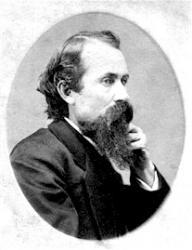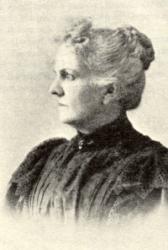Planning worship?
Check out our sister site, ZeteoSearch.org,
for 20+ additional resources related to your search.
- |
User Links
Person Results
‹ Return to hymnal


Export as CSV
Aldine S. Kieffer

1840 - 1904 Hymnal Number: d9 Author of "Turn to Jesus while he's pleading" in The Pathway of Praise No. 1 Full name Aldine Silliman Kiefer
Aldine S. Kieffer
Mrs. L. M. Beal Bateman
1843 - 1943 Person Name: L. M. Bateman Hymnal Number: d138 Author of "He has risen for me" in The Pathway of Praise No. 1 Pseudonym: Grace Glenn; Lucinda M. Beal Bateman lived in Ionia, Michigan. She wrote A book of rhymes to suit the times published about 1886 by N. Chapin & Son (Chicago); Gleams of gold published about 1889, and The prohibition speaker: a collection of readings, recitations, dialogues, tableux and songs for temperance and prohibition entertainments published in 1889 by Filmore Bros. (Cincinnati). She married Zadoc Henry Bateman in 1875. They had one daughter, Grace.
Dianne Shapiro, from "A book of rhymes to suit the times" and "The Genealogy of Dennis Bowen Caskey and Michelle Lynn Smith" (caskey-family.com/genhome, retrieved 7-1-2018)
Mrs. L. M. Beal Bateman
John H. McNaughton
1829 - 1891 Hymnal Number: d129 Author of "Love at Home" in The Pathway of Praise No. 1
John H. McNaughton
Anzentia Igene Perry Chapman
1849 - 1889 Person Name: E. W. Chapman Hymnal Number: d37 Author of "Hosanna to the Lamb, hosanna to the Lamb" in The Pathway of Praise No. 1 Anzentia Igene (Angie) Perry Chapman, 1849-1889. Born near Lansing, MI, Angie was the wife of Free Methodist minister, Edwin W. Chapman. They had three children. She helped on his evangelism tours and rural preaching circuits. They worked in Sparta, MI, and helped found the first Free Methodist church in Grand Rapids, MI. She also wrote hymn lyrics. In 1888 they followed an evangelistic tour of Kansas, and them moved to Isabella County, MI. She died in Mt. Pleasant, MI.
John Perry
Anzentia Igene Perry Chapman
Mary B. Wingate
1845 - 1933 Hymnal Number: d112 Author of "Spirit so gentle, Spirit so tender" in The Pathway of Praise No. 1
Mary B. Wingate
Eliza Holmes Reed
1794 - 1867 Person Name: Eliza Reed Hymnal Number: d86 Author of "[O] Why not tonight" in The Pathway of Praise No. 1 Reed, Eliza, née Holmes, was born in London, March 4, 1794; married to the Rev. Andrew Reed in 1816; and died July 4, 1867. Mrs. Reed entered fully and earnestly into her husband's extensive charitable works. Her publications include Original Tales for Children; and The Mother's Manual for the Training of her Children, 1865. Her hymns, 20 in all, were contributed to her husband's collection, and were republished with his in the Wycliffe Chapel Supplement, 1872. They are only of average merit, and have not attained to a marked position. They include:—
1. Gracious Lord, as Thou hast bidden. Holy Baptism.
2. I would be Thine, 0 take my heart . Dedication of Self to Christ.
3. 0 do not let the word depart. The Accepted Time.
4. 0 that I could for ever dwell. Communion with God Desired.
--John Julian, Dictionary of Hymnology (1907)
Eliza Holmes Reed
Laura E. Newell

1854 - 1916 Hymnal Number: d137 Author of "Beside the beautiful river" in The Pathway of Praise No. 1 Born: February 5, 1854, New Marlborough, Connecticut.
Died: October 13, 1916, Manhattan, Kansas.
Daughter of Mr. and Edward A. Pixley, but orphaned as an infant, Laura was adopted by her aunt, then Mrs. Hiram Mabie, who at the time lived in New York. In 1858, the Mabie family moved to a farm south of where Wamego, Kansas, now stands. Two years after the move, Mr. Mabie died, and his wife resumed teaching.
In 1860, Mrs. Mabie accepted a position in Topeka, Kansas, where she taught many years. Under her tutelage, Laura received her education. As early as age 12, Laura was writing rhymes, and two years later her poems began to appear in local newspapers. She had no thought of a literary career; she simply wrote to give vent to her poetical mind.
In 1871, Laura married Lauren Newell, a carpenter from Manhattan, Kansas. They had at least six children, and belonged to the Congregational denomination.
In 1873, Laura was listening to an address by a speaker who lamented the death of "genuine" hymns, and she resolved to try her hand in that line of work. That began a long period of writing songs, sacred and secular, services for all anniversary occasions, cantatas, adapting words to music, and music to words.
"Mrs. Newell is indeed a prolific writer. Her poems number in the thousands. She has had over eight hundred poems published in a single year, a most remarkable record. The great ease with which Mrs. Newell writes is one of her special gifts. Not long since an order, accompanied by music and titles, was sent her for eight poems to suit. At seven o’clock in the evening she sat down to her organ to catch the music. Then she went to her desk, and at ten o’clock the order was ready for the return mail. Her work pleased the publisher so well that he sent her an order for forty-eight additional poems. Mrs. Newell writes several hundred poems annually.
She is a very modest and unpretentious lady, and goes about her daily work as cheerfully as her poems advise others to do. The deeply religious character of the woman stands out boldly in nearly all her work. The next world is apparently as real to her as the present. Her heart is in her work, and to the end of life’s chapter, while able, may she wield her pen to tell the Story to dear to her heart, in verse and song." Hall, pp. 316-17
http://www.hymntime.com/tch/bio/n/e/w/newell_lep.htm
Laura E. Newell
J. G. Dailey
1854 - 1927 Hymnal Number: d46 Author of "I'll sing it, yes, I'll sing it" in The Pathway of Praise No. 1 Born: Circa March 1854, Delaware (was living in New Castle County in 1860).
Dailey moved to Brockwayville, Pennsylvania, with his mother in 1872, and was still there as of 1892. In 1900 he was in Fredonia Village, New York, and in Philadelphia, Pennsylvania, in 1910 & 1920. His works include:
A Collection of Gospel, Temperance, and Prohibition Songs, What’s the News (Brockwayville, Pennsylvania: 1888)
Love (Brockwayville, Pennsylvania: 1892)
Prohibition Chimes for Temperance, Prohibition and All Reform Meetings (New York: Dailey & Mead, 1900)
--www.hymntime.com/tch/
Additional information and photos can be found here:
James Gerald Dailey II (1854-1927) and Fear Not, Little Flock.
J. G. Dailey
Benjamin Francis
1734 - 1799 Hymnal Number: d79 Author of "My gracious Redeemer I [I'll] love" in The Pathway of Praise No. 1 Francis, Benjamin , M.A., was born in Wales in 1734. He was baptized at the age of 15, and began to preach at 19. He studied at the Bristol Baptist College, and commenced his ministry at Sodbury. In 1757 he removed to Horsley (afterwards called Shortwood), in Gloucestershire. There he remained, through a happy and very successful ministry of 42 years, until his death in 1799. He was the author of many poetical compositions :—
(1) Conflagration, a Poem in Four Parts, (1770); (2) Elegies on the Deaths of the Revs. George Whitefield , Caleb Evans, Robert Day, and Joshua Thomas; (3) The Association, a Poem (1790); (4) a Poetical Address to the Stockbridge Indians (5) two satirical pieces on the Baptismal controversy; The Salopian Zealot; and The Oracle, the former passing through several editions and being reprinted in America.
Francis was the author of five hymns in Rippon's Selections, 1787, all of which are still in common use :—
1. Before Thy throne, eternal King . Meetings of Ministers: or Church Conferences.
2. Glory to the eternal King. Majesty of God. In Snepp's Songs of Grace & Glory for Private, Family and Public Worship, 1872.
3. In tweet [loud] exalted strains . Opening of a Place of Worship . This was given in Rippon, No. 338, in 6 st. of 6 1. with the note:—“Sung on opening the Meeting House at Horsley, Gloucestershire, [his Chapel,] September 18, 1774; and also at the opening of the New Meeting House, at Downend, near Bristol, October 4, 1786."This hymn is abbreviated in the Baptist Hymnal, 1879, to 4 stanzas, and begins with st. iii. which is altered to "Come, King of glory, come." No. 1020 in Spurgeon's Our Own Hymnbook is the same arrangement of stanzas altered by Mr. Spurgeon to "Great King of Zion, now." In several American hymnals it reads: "Great King of glory, come."
4. My gracious Redeemer, I love. The love of Christ to Men. In various collections.
5. Praise the Saviour, all ye nations . Offertory. In Snepp's Songs of Grace & Glory, 1872, No. 739, "With my substance I will honour," is a cento from this hymn.
6. Ye objects of sense and enjoyments of time . Death. A long hymn of 16 st. of 4 l. given in the new and improved edition of Rippon, 1837, No. 553, Pt. ii. with the heading, "The dying Christian bidding adieu to the world." This hymn had previously appeared in the Baptist Register, 1795.
It was as a writer of Welsh hymns, however, that Francis excelled. In 1774 he published his Alleluia, neu Hymnau perthynol i Addoliad Cyhoeddus (Hymns pertaining to Public Worship) To this he contributed 103 hymns. A second volume appeared in 1786, to which he contributed 91 hymns, being a total of 194 in all [D. Sedgwick’s Manuscript]. Of these many are still in common use in Wales, the most popular being:—
1. Clod i'r bendigedig Oen—-a oddefodd.
2. Deffro 'nghalon, deffro 'nghan—-i ddyrchafu.
3. Gwyn fyd y dyn a gred yn Nuw.
4. Arglwydd grasol, clyw fy nghri—-a'm griddfanau.
5. Wele gadarn sylfaen Sion.
[Rev. W. R. Stevenson, M.A.]
-- John Julian, Dictionary of Hymnology (1907)
See also in:
Hymn Writers of the Church
Benjamin Francis
Bert Shadduck
1869 - 1950 Person Name: Burt H. Shadduck Hymnal Number: d44 Author of "The judgment morning" in The Pathway of Praise No. 1
Bert Shadduck


 My Starred Hymns
My Starred Hymns


